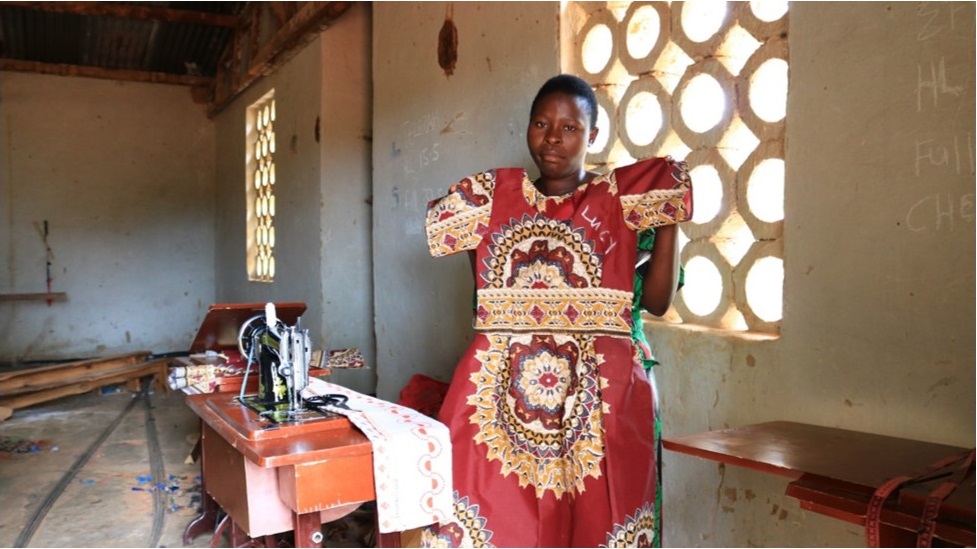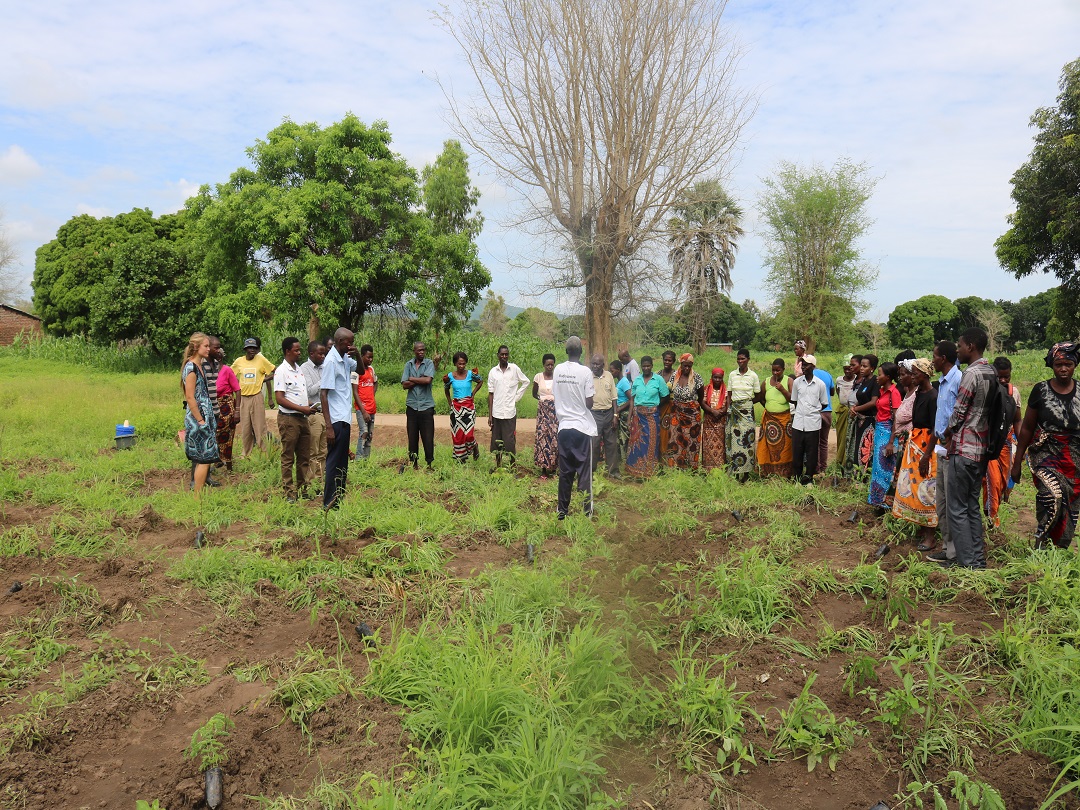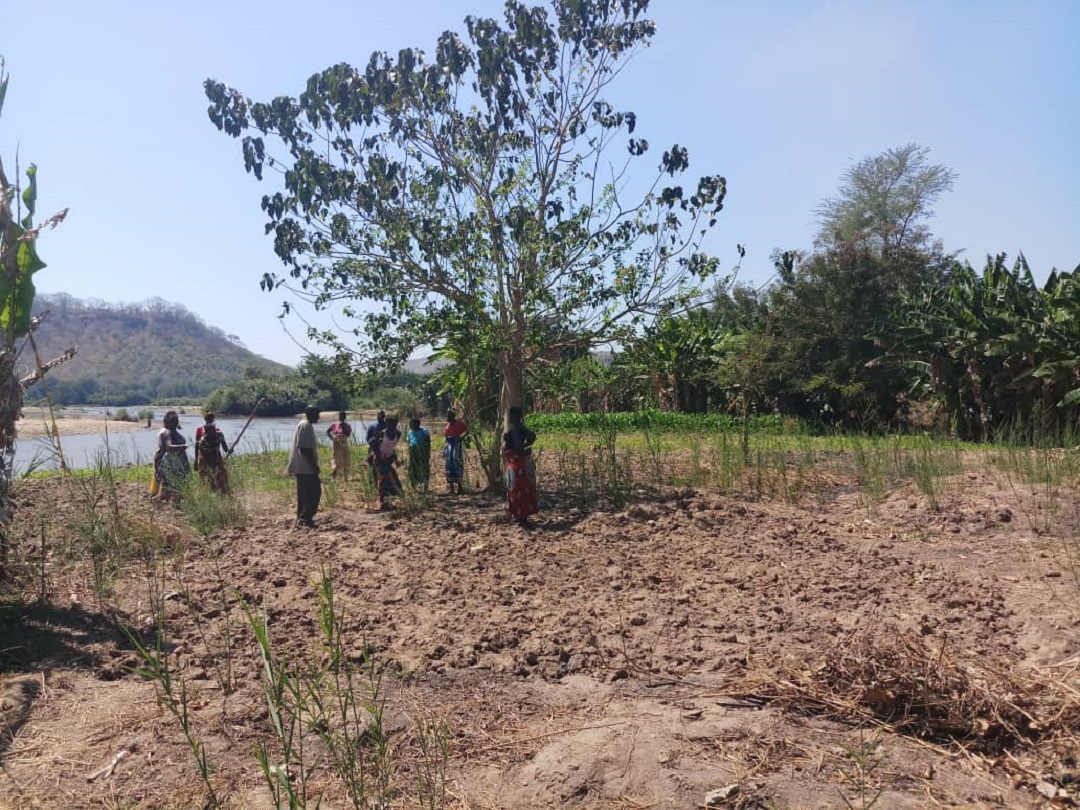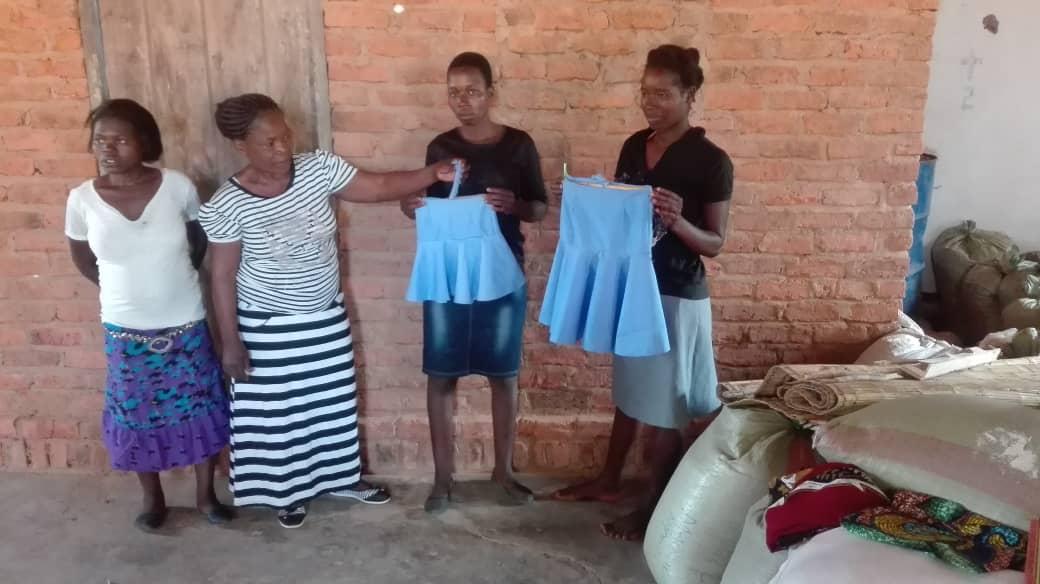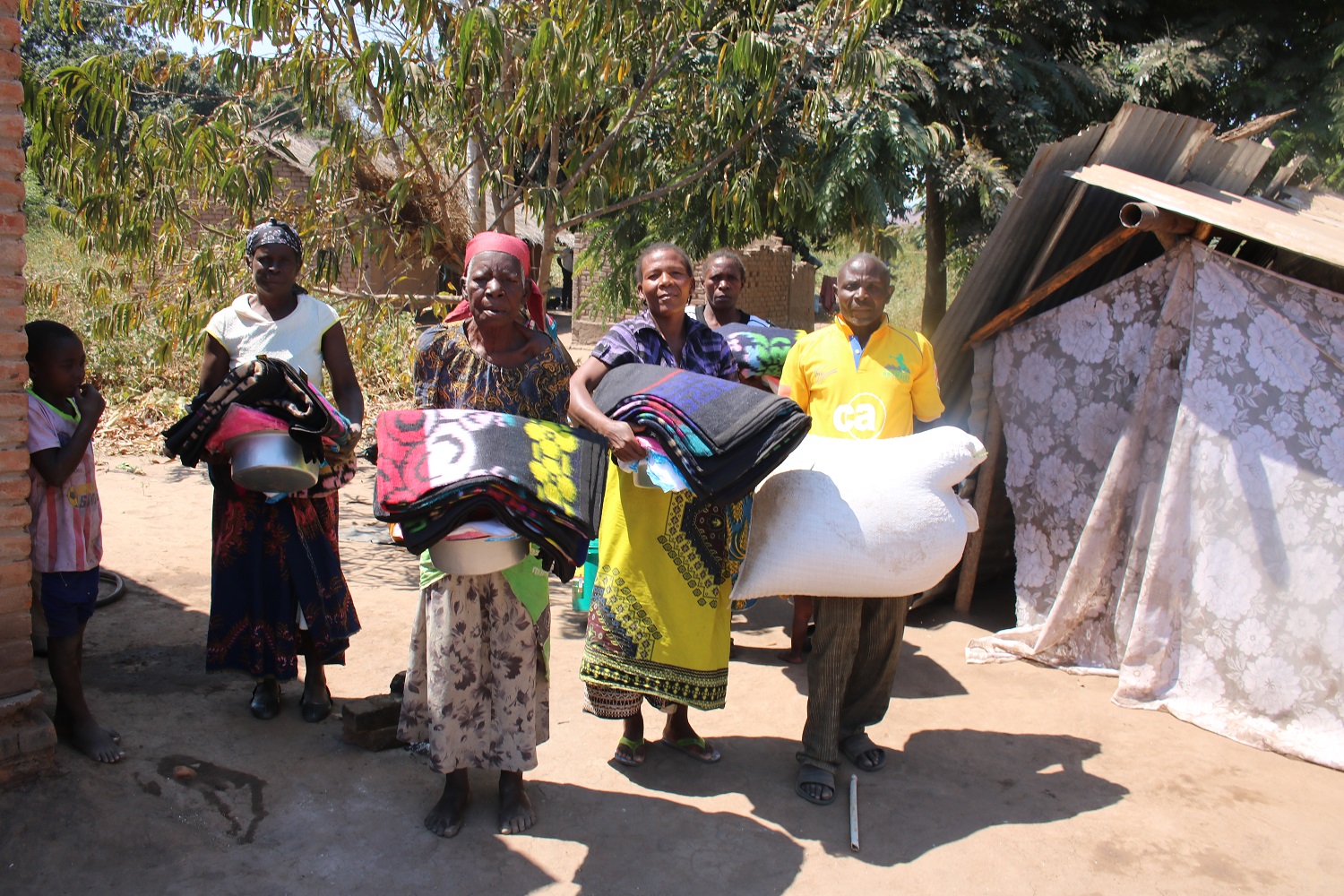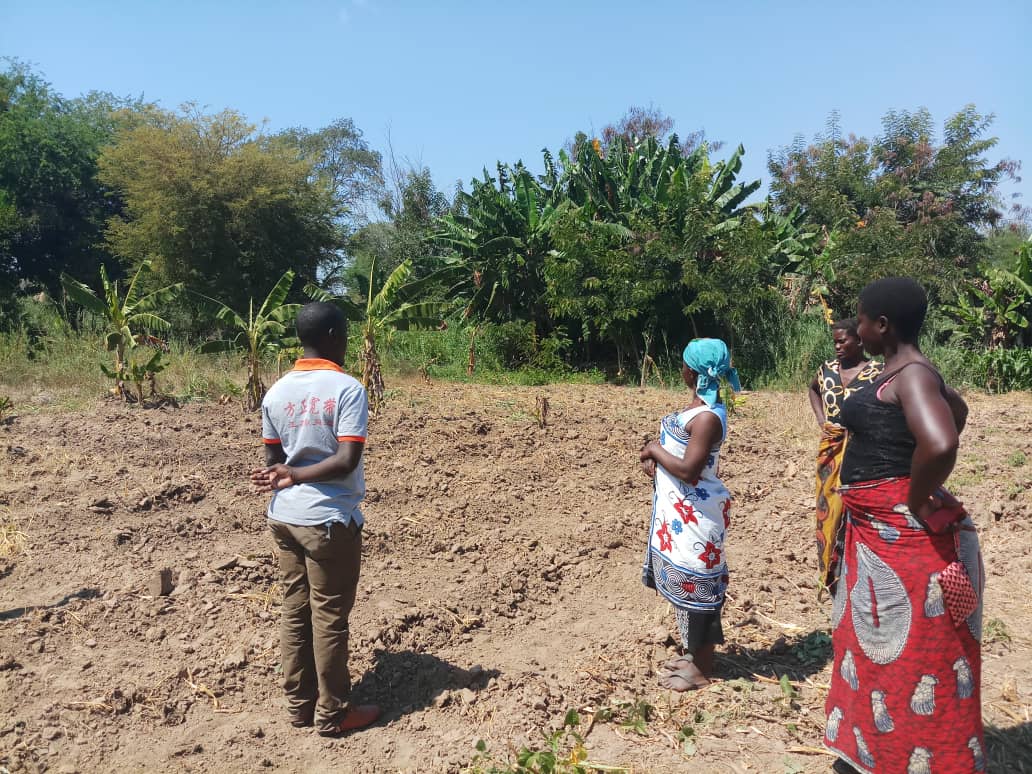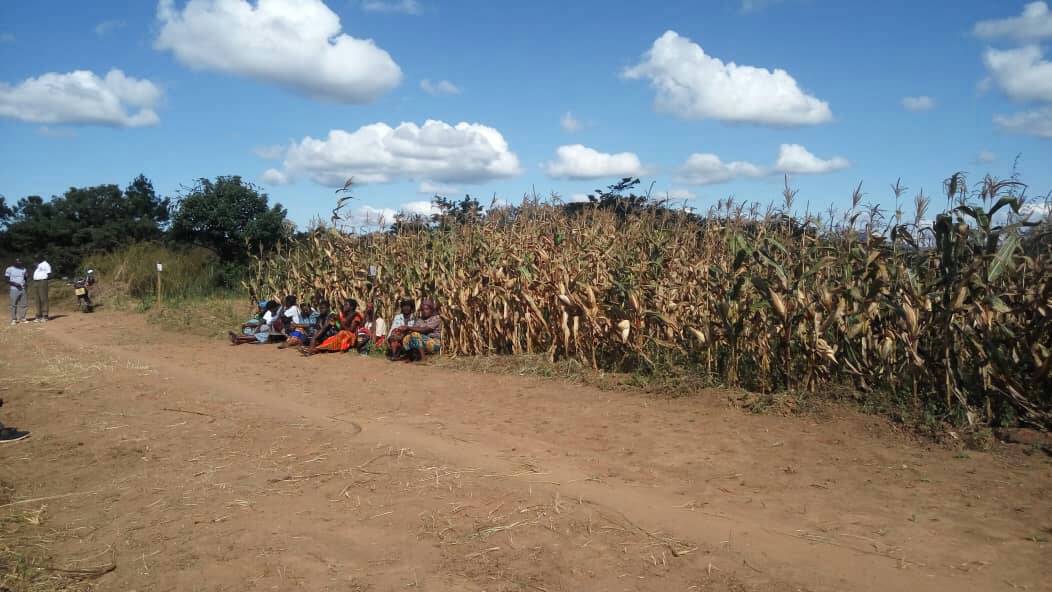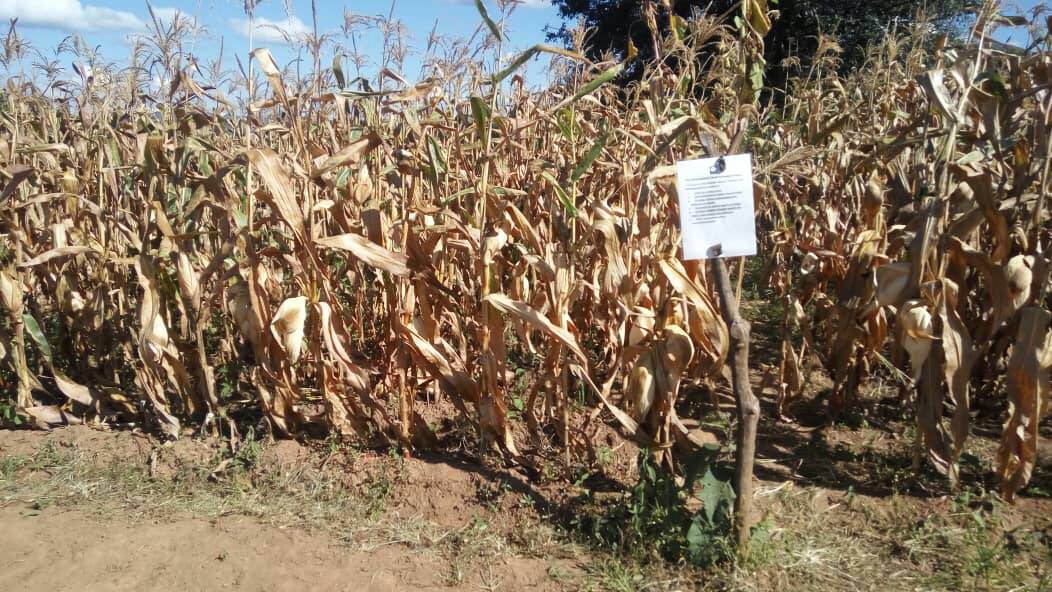Development Desk’s Vocational Skills Programme Gives a New Lease of Life to Women in Chisenga
By Gracious Chibaka
Concurrently stress and depression is building up, family problems weighing her life down, with no end in sight, as her just ended marriage relentlessly reminds her that she is of no value, poverty roaring like a hungry lion with no flesh to devour.
Negative thoughts have engulfed the 30-year-old Trintance Mtambo who does not even want to mention an inch of the many troubles she has sailed through, but sing praises for the timely rescue by the Development Desk.
Mtambo, a lady from Magomero Village in Traditional Authority Mwenewenya, Chitipa District, is one of the many beneficiaries bearing testimony that if an individual is empowered with Vocational skills her life and that of the community is transformed.
“I used to stay in Lilongwe with my husband but with the marriage failure I was forced to come back to the village. From that point, things turned sour. The only hope that I had was him, but here he is shuttering all the future I bestowed in the once lovely better half of mine” with tears rolling down her cheeks, narrates Trintance.
That was before enrolling in the Vocational Skills Training program, a brainchild of the Development Desk (popularly known as CADECOM among the locals) of the Diocese of Karonga.
“I used to stay idle, but thanks to the CADECOM [Development Desk] and the Catholic Church my story is a bitter-sweet story. At first I was reluctant to enroll due to lack of self-esteem. But I shoved out that fear, learnt the trade and here I am making a living out of tailoring” says Mtambo with, face beaming with a lovely smile of hope.
Development Desk, arm of Karonga Diocese, is offering different vocational skills like Bricklaying, Carpentry and Tailoring in the area for community members who did not go far with education such that individuals under the instruction of of experienced trainers.
“People in the village are giving me business nowadays. They come with their pieces of cloth and I sew for them with expertise, to the awe of many. I am making a living on my own a journey that I thought was for men.
If I continue working extra hard I am now assured, I will be able to construct a solid future with all the basic necessities at my disposal,” speaks out Tritance while showcasing one of her fashionable product she has made.
Vocational Skills Training Programme is a component under the Development Desk’s three-year Integrated Rural Development Project which is being implemented with financial support from Misereor Germany.
Development Desk Supports Tree Planting in Mwangolera Village
[wowslider id=”9″]By Deodatus Muriya
The Development Desk of the Diocese of Karonga is supporting communties to plant trees in the 2018/2019 tree planting season. Among of the villages targeted in this year is Mwangolera in the area of TA Kyungu, in Karonga
On 13 February, 2019 the Desk carried out a tree planting exercise in the village. On the day, Principal Group Village Headman Mwangolera assured the Diocese of Karonga and other stakeholders that he do everything possible to ensure that the trees planted survive by among other things protecting them from animals.
Mwangolera further thanked the Diocese for the various development initiatives in aid of his area. The traditional leader further asked the diocese to consider bee farming in the village woodlots as this may increase household income in his area.
Speaking on behalf of the Diocese of Karonga, Head of Monitoring and Evaluation Department; Deodatus Muriya assured the communities that the Diocese will continue supporting them in their afforestation drive by among other things helping them in raising nurseries and educating them on the benefits of investing in trees.
The event was attended by government officials, Non-Governmental Organisations working in the area and community leaders.
The Development Desk is expected to plant 139,000 trees in Chitipa and Karonga through the Integrated Rural Development Project in the 2018/2019 tree planting season with financial support from Misereor Germany.
Traditional Leaders Handover Handover 30 Hectares to Chinunu Scheme
By Maureen .P. Soko
Traditional leaders surrounding Chinunu Irrigation Scheme in Mwalughali Village under Traditional Authority Kyungu have on 2nd November, 2018 signed an agreement that the land belongs to community members who are members of the scheme.
The signing ceremony took place in the presence of the representative of the District Commissioner for Karonga District, the Caritas Secretary of the Diocese of Karonga, Mwawi Shaba and community members.
The signing of this agreement is an assurance that the community members can now develop the scheme, in collaboration with the Development Desk of the Diocese of Karonga, without fears of future land disputes which are common in Karonga.
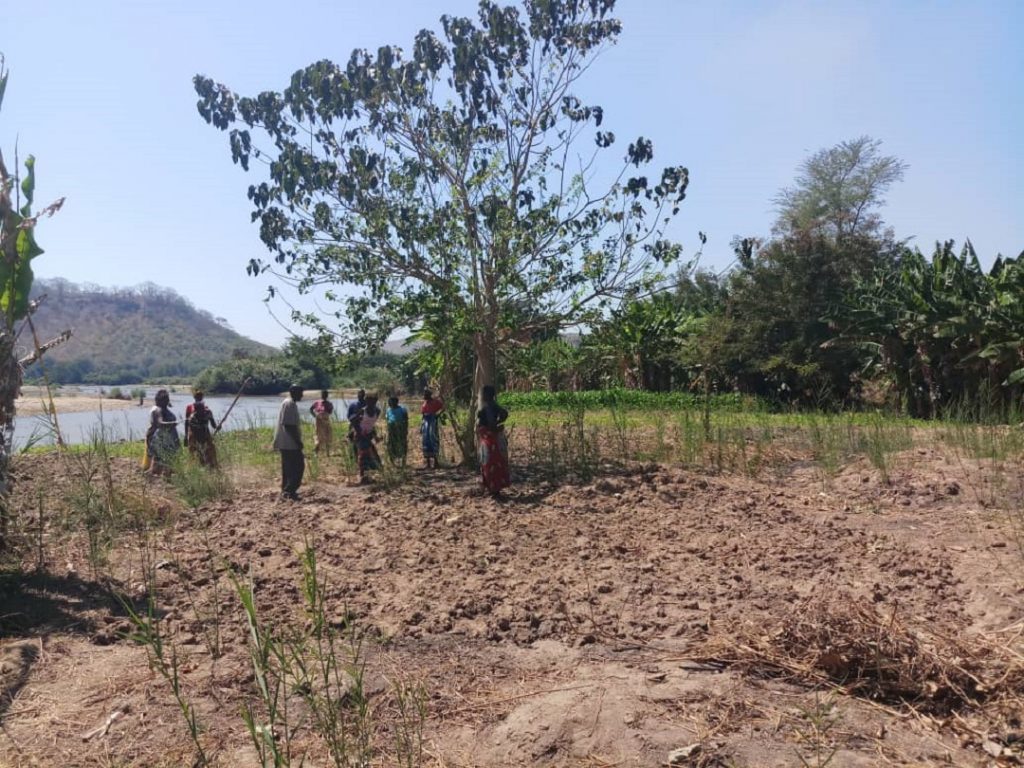
According to the Desk Officer for Development Desk of Karonga Diocese, Franklin Msiska, apart from evangelization, the Church has the mandate to help people in development activities like farming to ensure food security.
Mr Msiska said, the agreement will help to avoid wrangles since all parties have agreed that the land does not belong to anyone but the group.
He also added that the agreement will attract donors to aid the scheme.
“This agreement is very important because well wishers will be assured that their resources will be utilized effectively because no conflict will arise due to land ownership.” said Msiska.
On his Part, Mr Tembo who represented the District Commissioner appreciates the diocese for its efforts to develop the district. He advised scheme members to take good care of the scheme when fully established for it to benefit the community.
Talking on behalf of scheme members, President of Chinunu Scheme Lowani Simbeye said, currently the group depends on rain only because it does not have effective irrigation equipment, other than watering canes, which makes it difficult to irrigate during dry season.
According to him, hunger will be history in the area if they grow crops throughout the year.
Irrigation farming is one of the components under the Integrated Rural Development Project of the Development Desk. Among other things, the project is promoting climate smart agricultural technologies, vocational skills training for the youth, promoting afforestation and the use of energy efficient stoves. It is through this project, funded by Misereor Germany, that the diocese got into contact with members of Chinunu Scheme.
The Chinunu Irrigation Scheme started in 2009 with only 37 people, 32 women and 5 men but currently has more than 100 members.
Development Desk Rolls out Vocational Skills Training to 160 Youths in Karonga and Chitipa
By Elijah Banda
The Development Desk of the Diocese of Karonga has rolled out vocational skills training in carpentry, bricklaying and tailoring to 160 youths in Karonga and Chitipa districts.
This is one of the interventions under the Integrated Rural Development Project which is being funded by MISEREOR – Germany.

The training programme will impart skills on young people, in the three trades, to enable them open their own workshops. This is one way of helping the youth to generate income to support their households and guard themselves against being used as instruments of violence.
Speaking on the sidelines of the opening sessions of the trainings in Chitipa, the Development Desk Officer Mr Franklin Msiska urged the participants to take the trainings seriously by attending all the sessions.
“Your contribution to the program is your participation, as such you should ensure that you attend every training session so that at the end, the certificate of attendance should represent your true knowledge and skills gained,” said Msiska.

Speaking on behalf of the trainees in Chisenga, Emily Kanyuka thanked Karonga Diocese for the informal trainings which she described as beneficial to the youth once completed. She observed that there is high demand for the services in various communities.
“The trainings will empower us to help our households in income generation. This will enable us to contribute positively to the development of the nation unlike being given handouts by some individuals to incite violence in the communities,” said Kanyuka.
The Karonga and Chitipa Integrated Rural Development Project is being run for two years. The project supports young people who did not go beyond Malawi School Certificate of Education, who mostly do not qualify for formal tertiary education.
Development Desk of the Diocese of Karonga Support Mwakenja Mwangonde Village with Relief Items
By Deodatus Muriya (Head of Department M & E)
The Desk Officer for Development Mr Franklin Msiska has urged Mwankenja Mwangonde villagers to desist from selling relief items they have received courtesy of the Diocese of Karonga but rather use them for the benefit of their households.
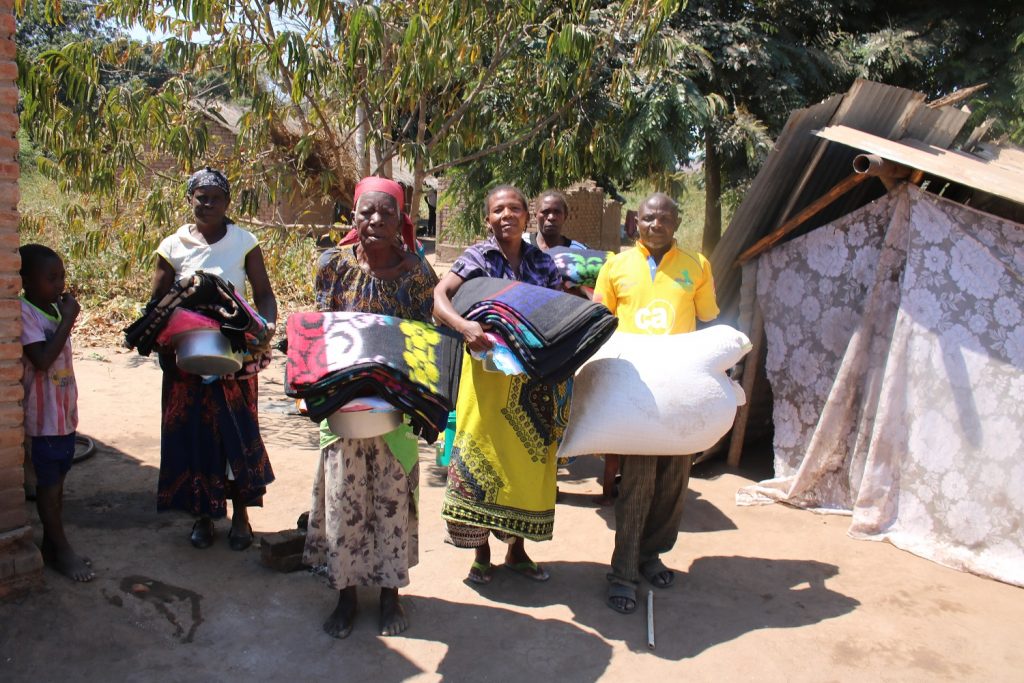
Mr Msiska made these remarks on 16th August, 2018 in Mwankenja Mwangonde Village where the Desk distributed relief items to the villagers, who were once victims of internal displacement following a violent conflict with neighbouring villages.
This is part of the Diocese of Karonga’s efforts to help these villagers in their resettlement process after spending nine months in exile. The Diocese has since December last year been supporting them with farm inputs and food.
Among the items distributed to each household were food items such as a 50 kilogram bag of maize, 10 kilograms of sugar beans, 10 kilograms of Likuni Phala and 2 litres of cooking oil. Other no food items included 4 pieces of cooking pots, 5 pieces of eating plates, 5 cups, and four pieces of blankets. The villagers also received farm inputs such as 50 kilogram of NPK fertilizer, 50 kilograms of Urea, 10 kilograms if maize seed, 3 bundles of cassava cuttings and three bundles of sweet potato vines.
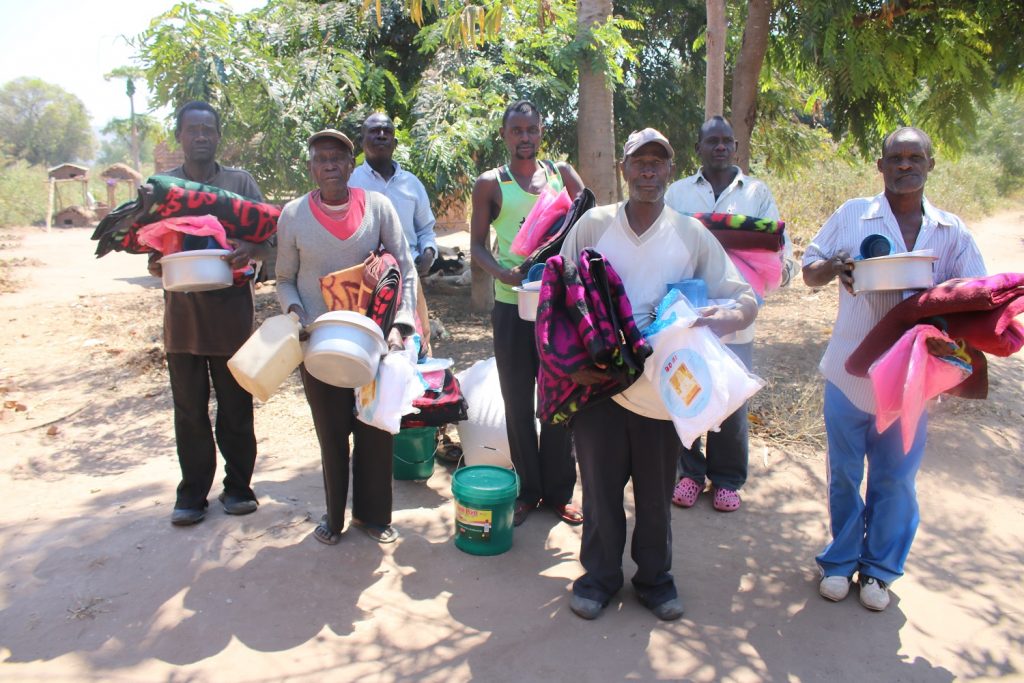
In his remarks, Village Headman Mwankenja Mwangonde thanked the Diocese of Karonga for the continuous support being provided to his subjects. He assured the Diocese that the relief items given to them will not be sold but used for the benefit of the community.
The Diocese of Karonga is implementing these resettlement interventions with financial support from the Diocese of Rottenburg-Stuttgart in Germany.
Development Desk Trains Mwankenja Mwangonde Villagers in crop production
Deodatus Muriya (Head of M&E Department)
From 8 to10 August, 2018, the Development Desk of the Diocese of Karonga conducted training in crop production at Mwankenja Mwangonde Village, TA Kyungu in Karonga District.
These villagers spent about nine months away from their village following a violent conflict with neighbouring villages. The Diocese of Karonga, through the Justice and Peace Desk, in collaboration with other key stakeholders played a crucial role in resolving the conflict and bringing the conflicting parties together.
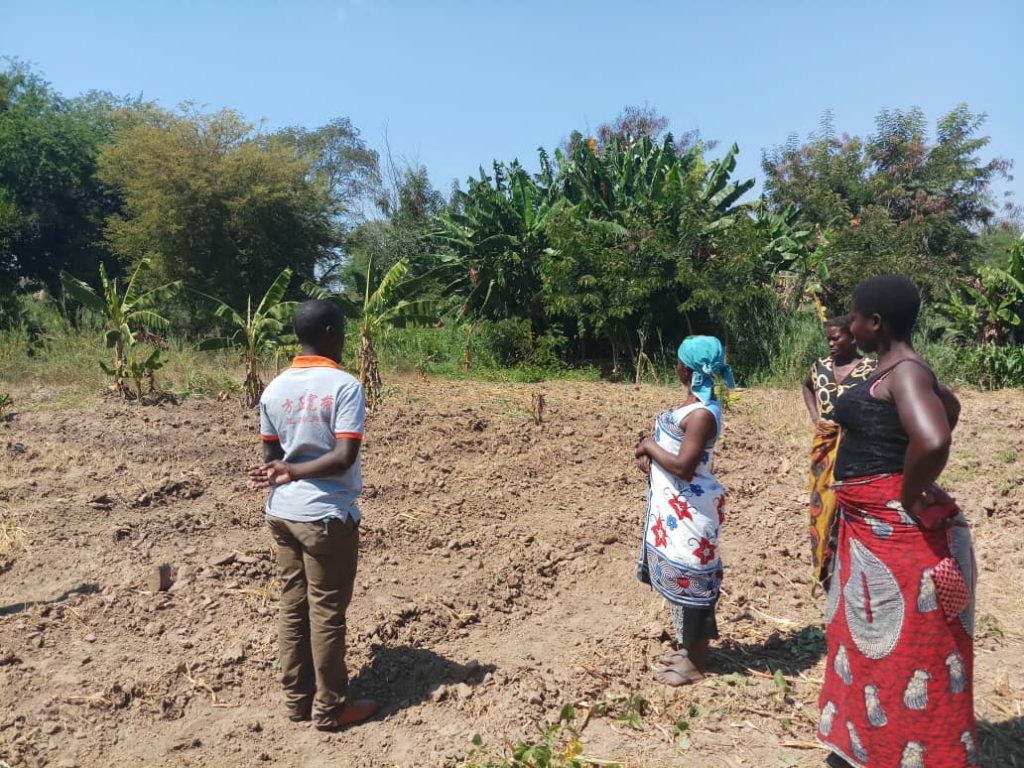
Now the Development Desk is helping in the post-conflict resettlement process by providing livelihood support in terms of relief food and crop production. The resettlement interventions to these once internally displaced people are being funded by the Diocese of Rottenburg-Stuttgart- Germany.
The topics covered during the training included group formation and dynamics, winter cropping and its technologies for crops like vegetables, maize and tomato. Farmers have also been trained in controlling fall armyworm attack using integrated pest management approach.

The Desk Officer for Development Franklin Msiska thanked the communities for active participation during the training and encouraged them to practice what they have learnt in their garden.
Village Headman Mwankenja Mwangonde thanked Karonga Diocese for the continuous support it has been providing to his subjects. He further asked the Diocese also to support other people within the Diocese who are also in need.
The training was facilitated by the Agricultural Extension and Development Officer (AEDO) for Mpata section and farmers were divided into five groups. Through these groups, they will plant maize and vegetables which will provide food and income, in case they sell the green maize and vegetables, hence improving food security and living standards at household level.
Development Desk Equips Staff on Sustainable Agricultural Practices
By Gibson Ngwira
As a way of improving annual agricultural productivity and reducing cost of production for farmers to get profit from their produce in the target areas of Lupembe, Misuku, Chisenga and Mwamkumbwa EPAs, the Development Desk of the Karonga Diocese trained its staff and government agricultural extension workers in sustainable agricultural practices.
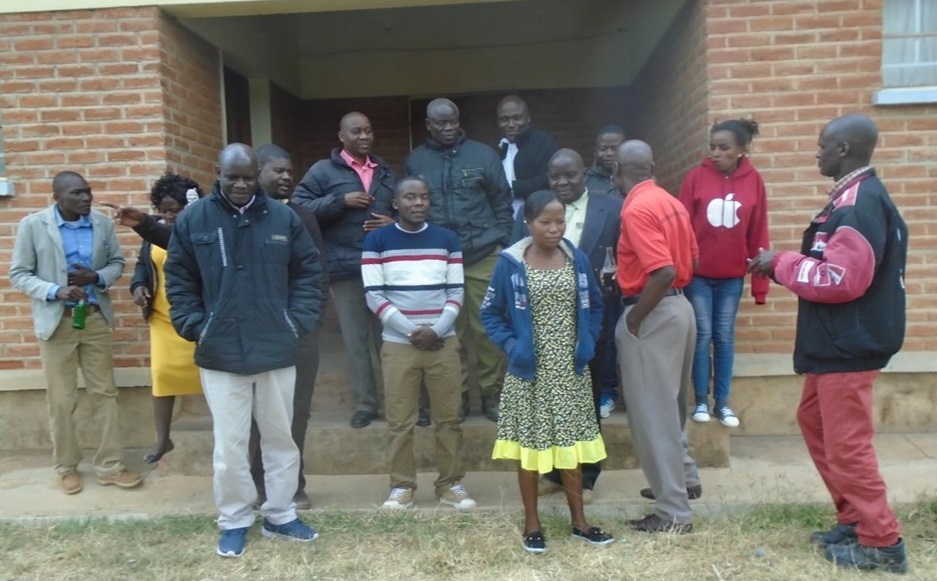
The training aimed at equipping the staff with skills on production of compost and liquid manure, use of mulching and crop rotation as techniques to improve soil fertility and cushion against dry spells.
Speaking during the opening of the training, the Caritas Secretary of The Diocese of Karonga, Mr. Mwawi Shaba urged all participants to take the training seriously so that the farmers could be assisted accordingly. Mr Mwabi Shaba said that the farmers can achieve socio-economic transformation through sustainable farming.
“Due to climatic change and loss of fertility in the soils, most smallholder farmers are performing poorly leading to low agricultural productivity regardless of the time and resources invested in the field. Farmers are getting less income from their produce due to high cost of production through constant use of fertilizers,” Said Mr. Shaba.
He further thanked facilitators from the District Agricultural Development Office (DADO) – Chitipa for accepting to train staff both from agriculture and the development desk.
The training drew participants from the Development Desk of the Diocese of Karonga and agricultural extension workers from the District Agricultural Development Offices of Karonga and Chitipa with facilitators from Chitipa DADO. The training was held at St. Kizito Conference Hall in Chitipa from 17th to 20th July, 2018.
The Development Desk of the Diocese of Karonga is implementing Integrated Rural Development Project in Lupembe EPA (Karonga), Misuku, Chisenga, and Mwamkumbwa EPAs in Chitipa District with funding from Miserior. The project started in July, 2017 targeting 2600 households.
Yields from Crops Grown Using SAPs Excite Small Scale Farmers in Chitipa District
By Elijah Banda
The Development Desk of Karonga Diocese is promoting Sustainable Agricultural Practices (SAPs) among small scale farmers in order to increase crop production under Integrated Rural Development Project.
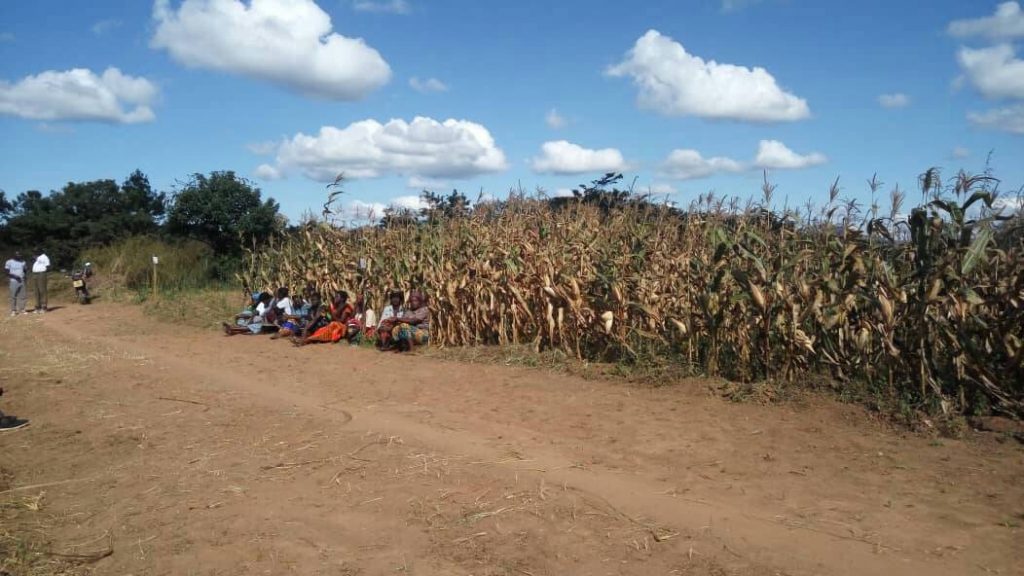
The project is being implemented in four traditional authorities namely, Mwenewenya, Mwenemisuku, and Mwabulambiya in Chitipa and Kyungu in Karonga District. The use of sustainable agricultural practices is helping increase resilience of small scale farmers against the impact of climate change. The technologies promoted are the use of compost and liquid manure, use of mulching for water conservation and soil improvement, pit planting, use of leguminous plants for inter cropping and crop rotation.
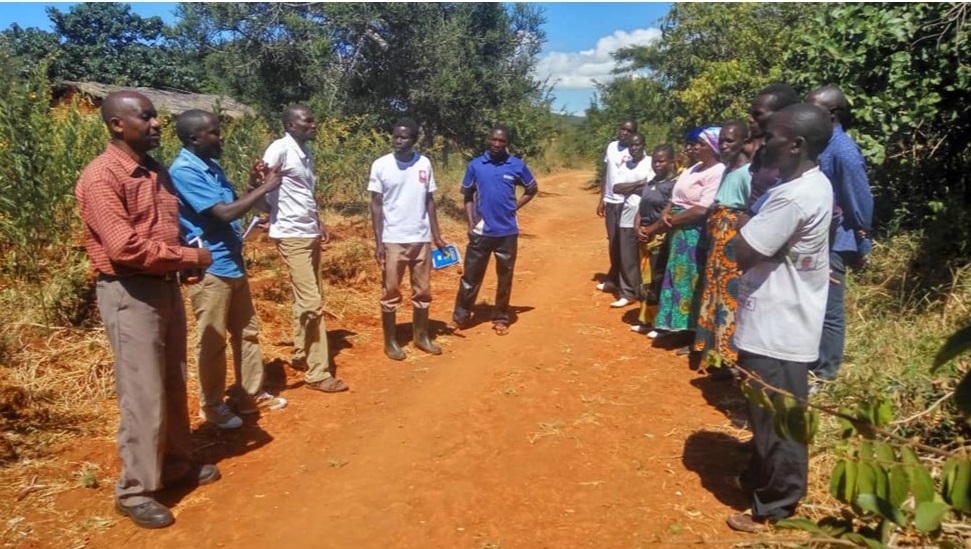
In 2017-18 farming season the project set up demonstration plots in all the four project sites in order to train farmers in these technologies and scale up its adoption. On 24th May, 2018, the Project Officer and officials from Chitipa District Agriculture Development Office (DADO) visited a number of demonstration plots under the project to appreciate how the demonstration plots performed and what farmers learned.
According to what the small scale farmers observed in the demonstration plots, the use of sustainable agricultural practices can help improve yields and therefore crop production. The plots which were applied with manure and planting was done in pits did very well even if the rains were not adequate as they were punctuated by dry spells.
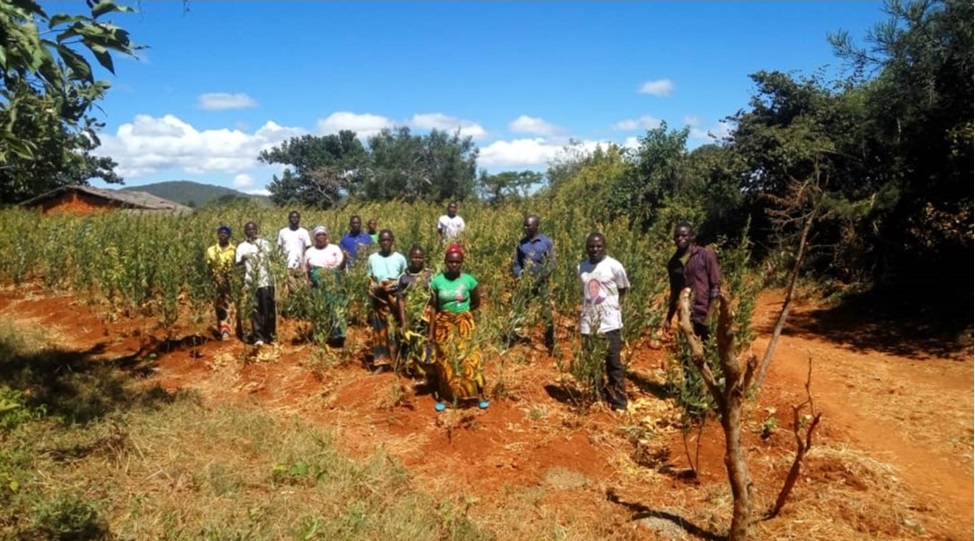
Small scale farmers also observed that the use of sustainable agricultural practices, e.g. manure, reduce the cost of production as less fertilizers were applied but still the maize plots did well in terms of yields. Most of the small farmers have promised to practice three or more technologies promoted by the project on at least a quarter acre during the next growing season.
In his remarks after visiting Takondwa club in Chisenga, the District Crops Officer, L. Mziza, expressed happiness with the performance of all the stands in demonstration plots. He was very much encouraged with the way the maize stand applied with manure and planted in pits performed. He reiterated the fact that the use of manure in maize production, and also in other crops, can reduce the production cost as farmers can apply less amount or no fertilizers at all.
“Farmers can get more profit from maize through use of manure since fertilizer is expensive apart from improving the soil which has lost vital nutrients,” He said.
Speaking on behalf of the farmers gathered at the demonstration site, one of the lead farmers, Lucy Sichali thanked the Development Desk of the Diocese of Karonga for the project which she said is timely to address the critical problem of under production of the staple food. She encouraged fellow farmers to put into practice the technologies promoted on a large scale in their respective fields. Karonga and Chitipa Integrated Rural Development Project is a three year project (2017-2020) funded by MISEREOR to the tune of MK 285 million.
Farmers under Karonga and Chitipa IRDP Start Producing Manure in Preparation for 2018-19 Farming Season
By Elijah Banda
Malawi is ranked among one of the poorest countries with about 53% of population living below the poverty line. The major source of livelihood is agriculture through direct employment, particularly the farming households, and others employed indirectly through organizations and companies working with farmers as extension agents and marketers.

The agricultural sector continues to face huddles despite numerous efforts by Government through the farm income subsidy program, which offers farm inputs to selected farmers at a reduced price. High poverty levels and high prices of farm inputs coupled by soil degradation subject farmers to little harvest every year and reduced economic activities through agriculture by both the farming households and the country at large. The under producing agricultural sector has contributed to a myriad of problems nutritionally, economically and socially among the people in the country. It is imperative therefore for more concerted efforts in order to curb the problem of food under production as a result of high prices of farm inputs.
Karonga Diocese, through the Chitipa and Karonga Integrated Rural Development Project (IRDP), is engaging farmers in cheap methods of producing manure which contain almost similar nutrients as provided by artificial fertilizers. The project is promoting use of Chinadango fertilizer produced from biomass material and sizable amount of fertilizers, compost manure produced from agriculture biomass materials and liquid manure produced animal waste. The project, apart from these manures, is also promoting farmers to plant nutrient fixing crops such as leguminous plants and tree species such as drycidia, tephrosia and farhebia albida
Visiting the farmers in Chisenga on 26th May 2018, Chitipa Land Resource Officer Mr L.Lwinga appreciated the efforts by CADECOM by encouraging farmers to start producing manure in time in order to ensure they plant on time and reduce the cost of production for the staple maize crop.
”Farmers need to know that manure works just as artificial fertilizer. And they are even better as they work for a minimum of three years unlike artificial fertilizers which only work for the application year,” he said.
Speaking during the visit, farmers expressed satisfaction with how maize applied with manure has performed in demonstration plots set by CADECOM. They have promised to make more manure this season in order to reduce the cost of maize production, whose selling price is not determined by the cost of production.
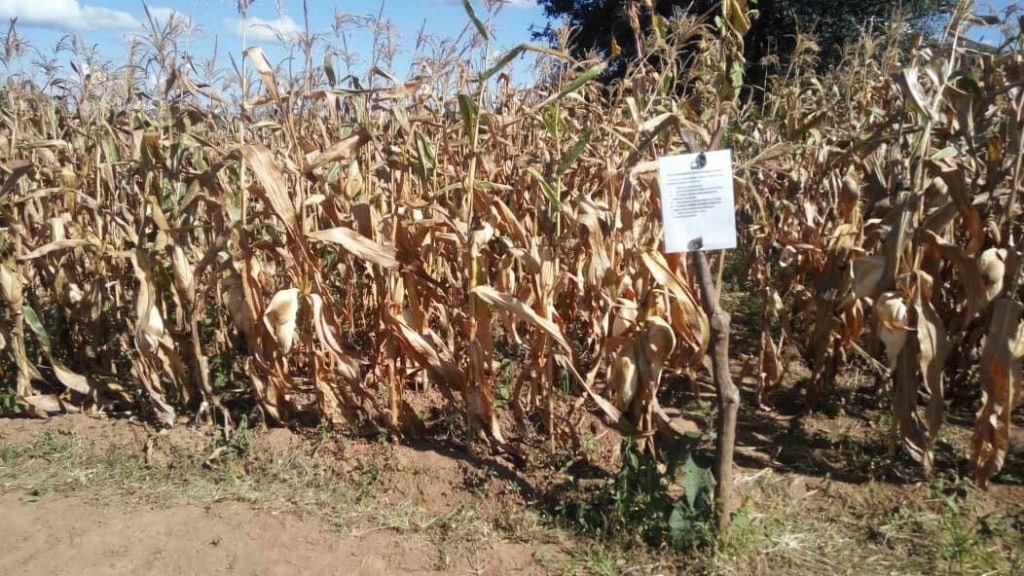
“We have started earlier this season because last year we started late and only managed to source manure for the demo fields. This season we will make more manure for our fields at home and the demo plot, “said Mary Munthali a farmer from Chisenga. She has already made 4 heaps of pit compost manure for winter cropping where she has planted maize and sweet beans.
Speaking to the farmers, CADECOM Project Officer, Mr Elijah Banda encouraged farmers to start earlier in making preparations for the 2018-19 farming season so that they plant their crops with the first rains
”Farmers should take farming as employment and should not necessarily go on holiday once they harvest their crops. It’s time to start land preparation, such as preparing pits for pit planting, preparing manure, winter farming and other activities to ensure they get maximum benefits from agriculture,” he said.
Chisenga, in Chitipa, is one of the project sites for Karonga and Chitipa Integrated Rural Development Project. Other sites in Chitipa are Mwankumbwa and Misuku with Kyungu in Karonga District. The project is benefiting 2400 farming households. Karonga and Chitipa Rural integrated project is a three year project (2017-2020) funded by MISERIOR to the tune of MK 285 million.
Development Desk Conducts Preliminary Assessment on the Extent of Flooding in Karonga
By Elijah Banda
Introduction
Karonga, just like other districts in the Northern Region, has been experiencing heavy rainfall from the 9th of April, 2018. The continuous rainfall has put the people along major rivers such as North Rukulu, Songwe, Kyungu and lwawa in the District on risk. The rains have affected areas under traditional authorities Mwakaboko, Kilupula in Karonga North and Kyungu in Karonga Central.
The Development Desk carried out a rapid assessment of the situation on 14 April and established that on the night of 12 April, 2018 around 12 midnight areas under Group Village Headmen (GVHs) Gweleweta and Katumbi in TA Kilupula were hit by a rainstorm which resulted in the flooding of Nkhalamu, Kasantha and Changwina Rivers. The floods affected 57 households (342 people) who were rendered homeless, destitute and desperate. Nearly the all affected households have no nowhere to seek refuge. The affected villages are Malopa, and Andrew in GVH Katumbi and Mfulu and Mangulu in the area under GVH Gweleweta.
The extent of the damage is moderate to severe and includes loss of crops, kitchen utensils, clothes, beddings, flour, livestock and other items. At the time of the rapid assessment, a large hectarage with variety of crops was still sub-merged in flooding waters which may increase the extent of the damage to crops mainly cassava and rice in these two GVHs.
The rapid assessment went further to TA Mwakaboko far north of Karonga District where 1 (one), man from Mwakaboko Village has been pronounced dead after drowning in Songwe River which receives water from Kyungu River. The preliminary findings indicate no severe damage to houses only to crops mainly rice that has been affected by Kyungu River.
Crops Affected
A number of crops have been affected and this includes major crops for the areas such as; Cassava, Rice, Sweet potato and Maize. However the most severely affected crop is rice.
Livestock Affected
The data compiling team at village level (Village Civil Protection Committee and Area Civil Protection Committee) has been in the field to collect and establish the findings which are expected to be shared soon to further detail the extent of the damage for the areas which were impassable during the rapid assessment by the Development Desk.
Affected People
There was loss of one life a man aged between 30 and 40 years in TA Mwakaboko. In total 57 households were affected representing a population of 342 people.
Interventions
Apart from water guard and chlorine provision by the Ministry of Health through health centres surrounding the villages, so far the affected households have not received any assistance of any kind. At district level, the District Civil Protection Committee (DCPC) Chair is calling for assistance from all the stakeholders so that the affected households can be assisted.
Immediate Assistance Required
Immediately the affected households needs the following assistance:
- provision of flour/maize and relish as to serve them from starvation
- tents / temporally shelter at GVH Katumbi where victims are sleeping in the church
- kitchen utensils
- beddings
- mats
- books and writing materials for school going children and
- More chlorine to safeguard them from water borne diseases.
Medium Term Intervention
In the medium term the affected households in the 5 villages will need the following assistance:
- Rehabilitation of damaged houses
- Construction of the damaged houses to those whose houses have been completely collapsed.
- Sensitizing on construction standards so as to withstand flooding.
- Relocating other households who are close to Kasantha River.
- Rehabilitating and conserving river banks of Kasantha, Kyungu and Nkhalamu River to avoid future incidences.
- Provision of seeds for winter cropping
- Provision of livestock e.g. pigs, goats, chickens, etc
- Provision of early maturing varieties for maize like DK 8033 and others
- Provision of sweet potato and cassava cuttings.
Below are figures showing magnitude of floods in Two TAs (Kilupula and Mwakaboko).
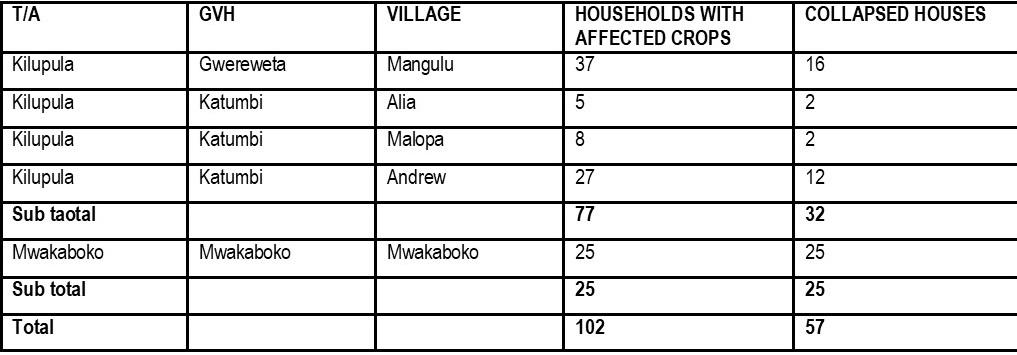
Below are pictures showing the extent of the damage in TA Kilupula
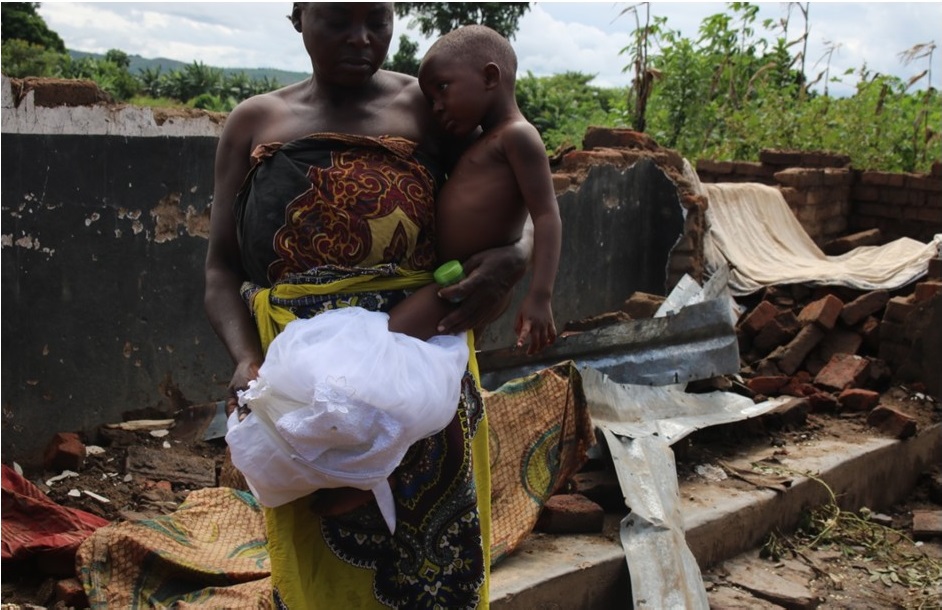
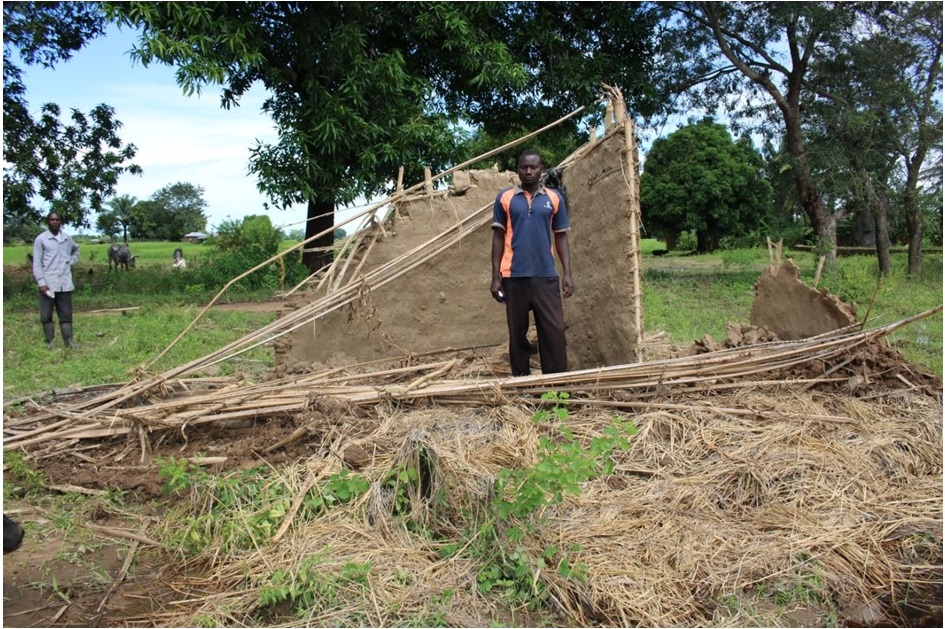
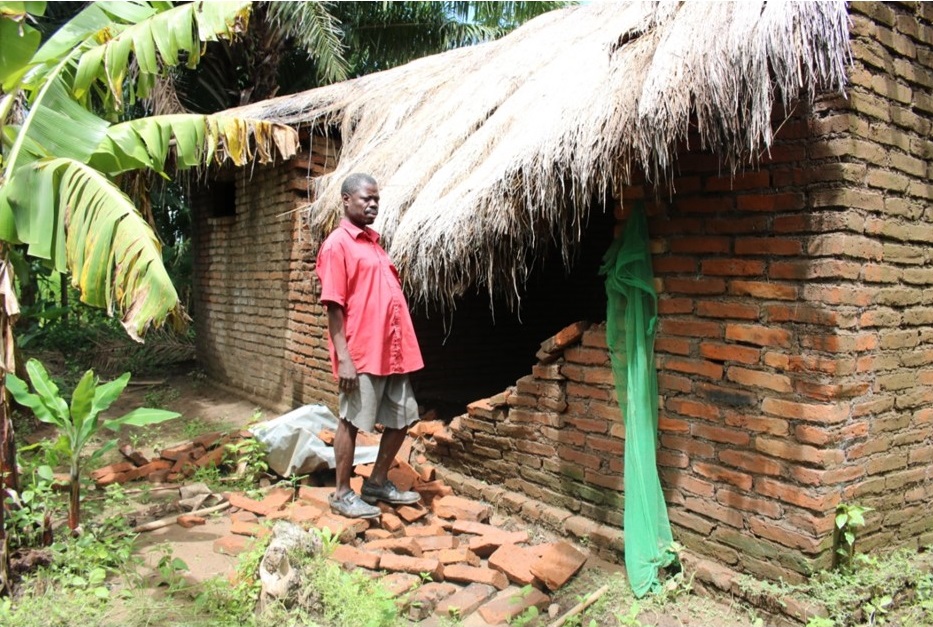
Conclusion
The rapid assessment through the Development Desk was an important exercise to establish and verify reports by VCPCs and ACPCs on the extent of damage by the flooding waters. The exercise can confirm that the flood victims need humanitarian assistance particularly food staff and cooking utensils and tents to support the people sleeping in the camp at Mangulu Village where men and women are sharing a non-demarcated church structure for shelter.

